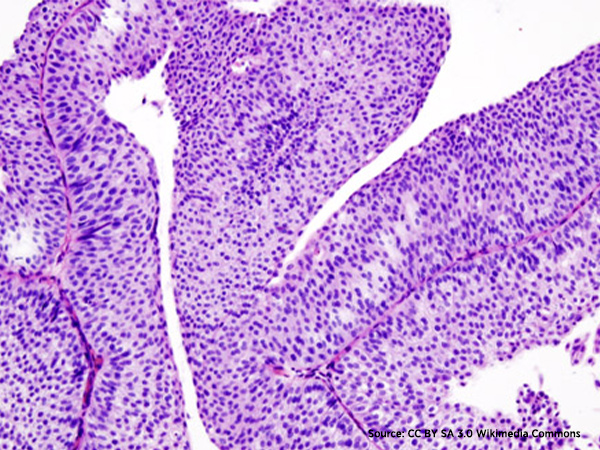Targeting Bladder Cancer
The first FGFR-targeted anticancer therapeutic to be approved by the FDA, erdafitinib, is intended for use in the treatment of the most common type of bladder cancer.
The U.S. Food and Drug Administration (FDA) recently approved a new molecularly targeted therapeutic called erdafitinib (Balversa) for treating certain patients with certain patients with urothelial carcinoma, the most common form of bladder cancer.

Specifically, erdafitinib is intended for treating patients who have locally advanced or metastatic urothelial carcinoma that tests positive for specific FGFR2 or FGFR3 genetic alterations and that has progressed during or after treatment with a platinum-based chemotherapeutic.
Bladder cancer is the sixth most commonly diagnosed cancer in the United States, according to the National Cancer Institute. More than 90 percent of the 80,470 new cases of bladder cancer expected to be diagnosed in the United States in 2019 will be classed as urothelial carcinomas because they will arise in cells that comprise the transitional cell urothelium that lines the bladder.
Research has shown that up to 30 percent of urothelial carcinomas have an alteration in one of four FGFR genes, FGFR1, FGFR2, FGFR3, and FGFR4. These data suggest that targeting FGFRs might provide a new approach to treating urothelial carcinoma.
Erdafatinib is the first FGFR-targeted anticancer therapeutic to be approved by the FDA. Its approval for the treatment of locally advanced or metastatic urothelial carcinoma that tests positive for specific FGFR2 or FGFR3 genetic alterations was based on results from the phase II Study BLC2001 clinical trial, according to the FDA. The results showed that 32.2 percent of the 87 patients who received erdafatinib had complete or partial tumor shrinkage. The median duration of these responses was 5.4 months.
The FGFR genetic alterations detected in the tumors of the patients enrolled in the trial were mutations in FGFR3 or gene fusions involving either FGFR2 or FGFR3, according to Janssen Pharmaceutical Companies, which market erdafatinib.
The FDA approved a new test to detect these and other specific FGFR genetic alterations at the same time as it approved erdafatinib. Use of the new test, which is called the therascreen FGFR RGQ RT-PCR Kit, is required to identify those patients with locally advanced or metastatic urothelial carcinoma for whom erdafatinib is an appropriate treatment option.
The FDA approval was rendered on April 12, 2019.
